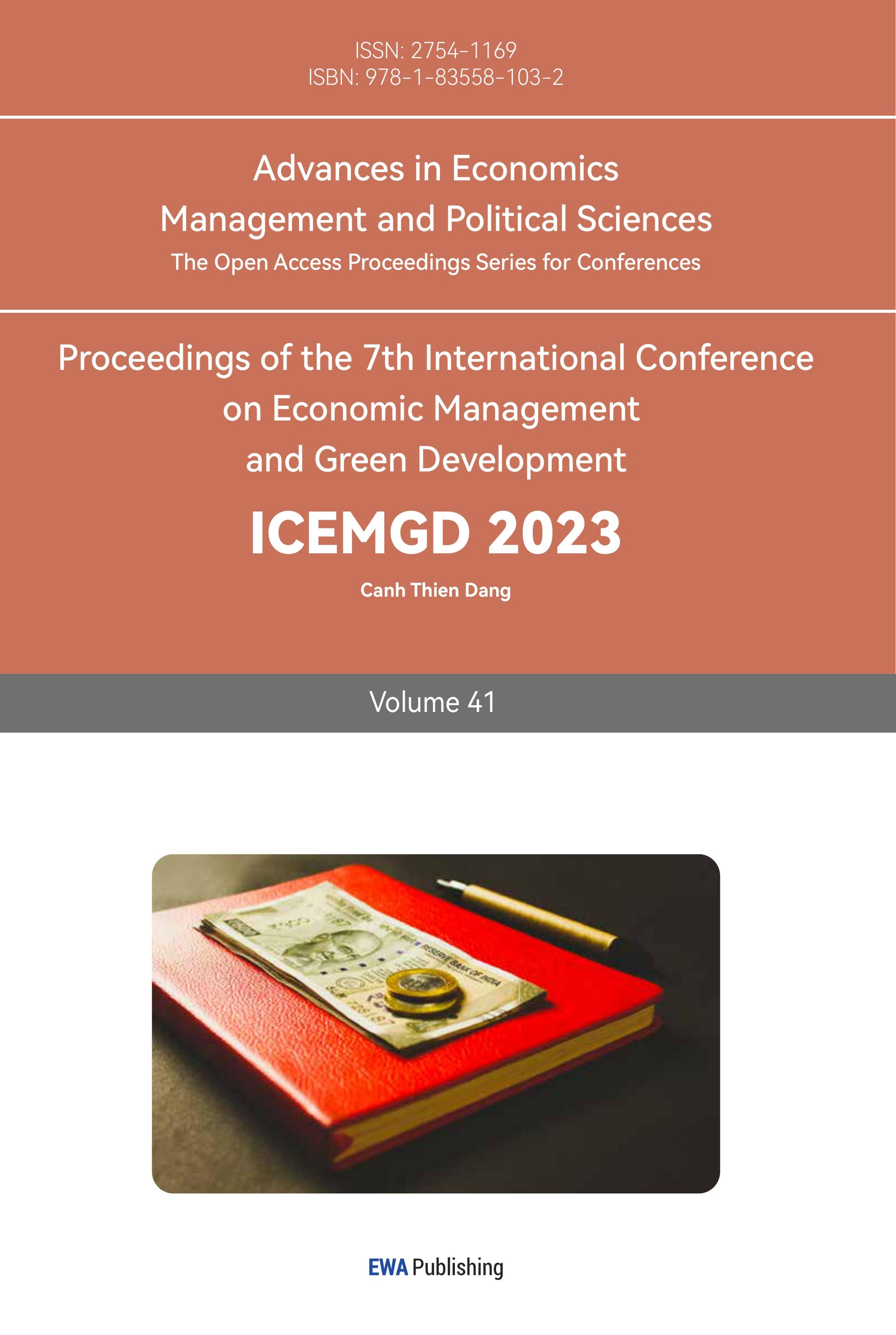References
[1]. Li C, Mirosa M, Bremer P. Review of Online Food Delivery Platforms and their Impacts on Sustainability. Sustainability. 2020; 12(14):5528. https://doi.org/10.3390/su12145528.
[2]. Raj, M., Sundararajan, A., & You, C. (2020). COVID-19 and digital resilience: Evidence from Uber Eats. arXiv preprint arXiv:2006.07204.
[3]. Payne, J., Bettman, J. R., & Johnson, E. J. (1991). Consumer decision making. Handbook of consumer behaviour, 50-84.
[4]. Jin, Y. Z. & Li, C. (2020). Research on food safety supervision in the context of Internet – a case study of the third-party online delivery platform in Yangzhou, Market Weekly, 33(09), 38-40.
[5]. Gavilan, D., Balderas-Cejudo, A., Fernández-Lores, S., & Martinez-Navarro, G. (2021). Innovation in online food delivery: Learnings from COVID-19. International journal of gastronomy and food science, 24, 100330.
[6]. Lu, S. & Li, J. L. (2021). A study on the impact of COVID-19 on Internet enterprises – taking Meituan Dianping as an example, Journal of Hubei University of Economics:Humanities and Social Sciences, 18(02), 48-51.
[7]. Meena, P., & Kumar, G. (2022). Online food delivery companies' performance and consumers expectations during Covid-19: An investigation using machine learning approach. Journal of Retailing and Consumer Services, 68, 103052.
[8]. Chen McCain, S. L., Lolli, J., Liu, E., & Lin, L. C. (2022). An analysis of a third-party food delivery app during the COVID-19 pandemic. British Food Journal, 124(10), 3032-3052.
[9]. Tang, Y., & Zhan, Y. R. (2020). Research on innovative business strategy of Internet platform enterprises under the new coronavirus epidemic – Meituan's new retail expansion Road. China Circulation Economy, 2264(32), 3-5.DOI:10.16834/j.cnki.issn1009-5292.2020.32.001.
[10]. Ma, J. Y. (2002). Research on the improvement of packaging design of takeaway food in the post-epidemic era. DOI:10.27175/d.cnki.gjxcu.2022.000226.
Cite this article
Cui,S. (2023). The Impact of the Epidemic on Consumer Decision-making in the Online Food Delivery Industry. Advances in Economics, Management and Political Sciences,41,65-69.
Data availability
The datasets used and/or analyzed during the current study will be available from the authors upon reasonable request.
Disclaimer/Publisher's Note
The statements, opinions and data contained in all publications are solely those of the individual author(s) and contributor(s) and not of EWA Publishing and/or the editor(s). EWA Publishing and/or the editor(s) disclaim responsibility for any injury to people or property resulting from any ideas, methods, instructions or products referred to in the content.
About volume
Volume title: Proceedings of the 7th International Conference on Economic Management and Green Development
© 2024 by the author(s). Licensee EWA Publishing, Oxford, UK. This article is an open access article distributed under the terms and
conditions of the Creative Commons Attribution (CC BY) license. Authors who
publish this series agree to the following terms:
1. Authors retain copyright and grant the series right of first publication with the work simultaneously licensed under a Creative Commons
Attribution License that allows others to share the work with an acknowledgment of the work's authorship and initial publication in this
series.
2. Authors are able to enter into separate, additional contractual arrangements for the non-exclusive distribution of the series's published
version of the work (e.g., post it to an institutional repository or publish it in a book), with an acknowledgment of its initial
publication in this series.
3. Authors are permitted and encouraged to post their work online (e.g., in institutional repositories or on their website) prior to and
during the submission process, as it can lead to productive exchanges, as well as earlier and greater citation of published work (See
Open access policy for details).
References
[1]. Li C, Mirosa M, Bremer P. Review of Online Food Delivery Platforms and their Impacts on Sustainability. Sustainability. 2020; 12(14):5528. https://doi.org/10.3390/su12145528.
[2]. Raj, M., Sundararajan, A., & You, C. (2020). COVID-19 and digital resilience: Evidence from Uber Eats. arXiv preprint arXiv:2006.07204.
[3]. Payne, J., Bettman, J. R., & Johnson, E. J. (1991). Consumer decision making. Handbook of consumer behaviour, 50-84.
[4]. Jin, Y. Z. & Li, C. (2020). Research on food safety supervision in the context of Internet – a case study of the third-party online delivery platform in Yangzhou, Market Weekly, 33(09), 38-40.
[5]. Gavilan, D., Balderas-Cejudo, A., Fernández-Lores, S., & Martinez-Navarro, G. (2021). Innovation in online food delivery: Learnings from COVID-19. International journal of gastronomy and food science, 24, 100330.
[6]. Lu, S. & Li, J. L. (2021). A study on the impact of COVID-19 on Internet enterprises – taking Meituan Dianping as an example, Journal of Hubei University of Economics:Humanities and Social Sciences, 18(02), 48-51.
[7]. Meena, P., & Kumar, G. (2022). Online food delivery companies' performance and consumers expectations during Covid-19: An investigation using machine learning approach. Journal of Retailing and Consumer Services, 68, 103052.
[8]. Chen McCain, S. L., Lolli, J., Liu, E., & Lin, L. C. (2022). An analysis of a third-party food delivery app during the COVID-19 pandemic. British Food Journal, 124(10), 3032-3052.
[9]. Tang, Y., & Zhan, Y. R. (2020). Research on innovative business strategy of Internet platform enterprises under the new coronavirus epidemic – Meituan's new retail expansion Road. China Circulation Economy, 2264(32), 3-5.DOI:10.16834/j.cnki.issn1009-5292.2020.32.001.
[10]. Ma, J. Y. (2002). Research on the improvement of packaging design of takeaway food in the post-epidemic era. DOI:10.27175/d.cnki.gjxcu.2022.000226.









